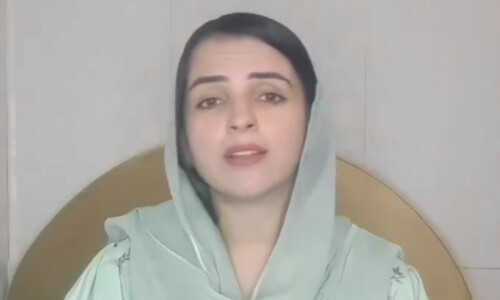ISLAMABAD: In a report launched by Pakistan Institute of Legislative Development and Transparency (Pildat) on Monday, Jamaat-i-Islami (JI) stayed on top in terms of internal democracy in 2015, while the PML-N remained as the least democratic party for the second consecutive year.
Irregular or no party meetings, a lack of competitive elections and continuation of the same leadership since the founding of the PML-N are the factors perceived as the major weaknesses in its democratic character.
Of the selected eight political parties, the PML-N is followed by MQM and JUI-F, rated as the second least democratic parties among the eight evaluated.
The Pildat score card places the JI at number 1 with 56 per cent score, National Party (NP) at number 2 with 47pc score, the PTI at number 3 with 44pc score, Awami National Party (ANP) at number 4 with 40pc score, Pakistan People’s Party (PPP) at number 5 with 36pc score, Jamiat Ulema-i-Islam-(JUI-F) and Muttahida Quami Movement (MQM) both at number 6 with 33pc score, and the PML-N at number 7 with 31pc score.
The report observed that PTI’s 2012-13 intra-party elections were among the most popularly contested and elaborate in the country’s history, but they turned out to be deeply flawed by the party’s own admission.
JI still most internally democratic, PTI slips to third position
It said the next intra-party elections scheduled to be held this year will decide not only the party’s own democratic credentials but the success or failure of the experiment may also decide the future trends in the internal party elections of political parties in Pakistan.
The report concluded that the state of internal democracy of political parties in Pakistan, though not in a good shape the previous year, had further deteriorated in 2015 as their overall score dropped to 40 (out of 100) against 43 in 2014.
It noted that most parties strengthened shadow of their leaders and intra-party elections were a mere formality in most cases. It also noted that there was a lack of co-relation between internal democracy and mass popularity of political parties.
Regular elections, regular change in leadership through elections, regular meetings of the consultative council (Shura) and the working committee (Aamla) and discouragement of dynastic leadership within the party, have rated the JI as the most democratic political party.
The report said a landmark amendment was made in the constitution of the party in October 2015 in which 10 seats were allocated for women in the party’s Majlis-i-Shura. Although JI follows a particular type of internal democracy in which there are no candidates in the party elections and the electioneering is not allowed, this peculiarity has not come in the way of the party securing top position as the most democratic party.
The National Party (NP) (currently led by Senator Mir Hasil Khan Bizenjo) has emerged as the second most democratic party with an overall score of 47pc. In 2014, it held 4th position.
Regular changes in top leadership since its founding in 2003, party conventions conducted in 2015 in which transparent party elections also took place for all four provincial chapters and the absence of any sign of dynastic leadership added to the democratic credentials of NP.
In order to assess democracy within political parties objectively and scientifically, a framework consisting of 12 indicators was devised by a broad-based steering committee constituted by Pildat.
Eight major political parties were selected for the assessment. Five of them - (PML-N, PPP, PTI, JUI-F and MQM) - hold the largest number of seats in the National Assembly (2013-2018). Three other parties were chosen to either represent Balochistan (NP) and Khyber Pakhtunkhwa (ANP) or to capture a peculiar brand of internal democracy in the form of the JI.
Published in Dawn, February 23rd, 2016















































